The forest teaches us this: emergence happens in its own time.
Beauty arrives fully formed from hidden networks of care, and we need not understand perfectly to be nourished by it.
A delta flower scarab beetle lands on red milkweed, pretending to be dangerous, dressed in wasp-bright warnings. Instead, she is harmless, lovely, exactly herself.
The forest teaches us this, too: we are more than our disguises.
⌘
From Greta Anderson’s Nature Journal,
Vaasa, Finland, 1891
Olli’s body was never found. This fact lived in Annu like a splinter she could not remove—painful when she pressed against it, yet impossible to grasp. She walked the paths they once shared, but differently now. Searchingly. With eyes that read the forest like a letter written in a language she did not understand.
She made an agreement with herself.
Live five more days.
Five days of rising when light first touches the window glass.
Five days of keeping the fire going.
Five days of walking the paths I know.
Each day, a mourning dove calls from the bare oak outside my window. Its song carries the same hollow note that has taken up residence in my chest. As if sorrow were a form of music worth making. I do not sing along—nor allow myself to cry—for fear that I may never stop.
Grief had altered ordinary time. Now, the forest was fogging the boundaries between past and future, yielding instead to softer rhythms. Five days were as long as Annu could agree to continue. Each interval stretched like its own small season.
Live just five days, then five days more.
The stark winter woods received her bewilderment with its calm face. Unadorned. Bereft. Here, among the bare trees, she found a sympathetic mirror. In winter’s spacious honesty, a tenderness began to take root in the dark soil of loss.
This tenderness was a beauty that insisted upon itself, even in the hardest places. Lichen wrote its patient stories across frozen bark. Winterberry held its red courage against gray stone. Moss threaded life through spaces so narrow they should not support anything at all.
Annu began filling her Forest Codex with these small survivals.
Yesterday, watching a cardinal flash red against fresh snow, I felt two things simultaneously—the sharp cut of joy and the deeper ache of wanting to point it out to Olli. The forest is teaching me how grief and beauty are collaborators, each making the other more true.
The same book, where she once recorded her grandmother's healing recipes, now held pressed violets, bold enough to bloom beneath snow. She made bark rubbings from ancient maples whose scars told stories in rings. She sketched the delicate skeletons of leaves that revealed every vein like the most intricate lacework.
Something curious was happening to Annu.
On her walks, she found herself gathering materials with a different kind of attention—not just for preservation, but for some purpose she didn’t yet understand. She chose a curved piece of birch bark, five red winterberries, a small piece of lichen, bright as jade against dark stone. She arranged them in a spiral on a flat rock down by the creek, and for those few moments, something shifted. The pattern held both impermanence and beauty. And these small arrangements, these temporary altars of winter's gifts, felt like quiet prayers.
For a moment, the feeling was larger than her grief.
Five days, then five days more.
The Forest Codex had become her practice of witness—no longer just instructions for healing others, but a discipline of healing herself through attention.
As she walked, Annu thought about how little she truly knew about the workings of healing, even after years of tending the village's people. She had seen wounds close overnight after the simplest poultice of plantain and honey, yet watched others fester despite her grandmother's most potent remedies.
She remembered Mari's infected finger—how the woman had apologized for waiting so long to come, for letting it get so bad. I kept thinking it would heal on its own, Mari had said, knowing her hope had been false. Annu had simply nodded, focusing on the heat radiating from the wound. The plantain poultice drew out the poison overnight, but Annu wondered now if there had been something healing in the listening, in letting Mari tell and release the whole story of her fear.
She had brewed countless cups of willow bark tea for fever. Some fevers broke when she expected, others lingered for reasons she couldn't name. But she had learned to sit beside the sickbed anyway, watching for what each person needed—water or broth, stories or silence.
The heart was the greatest puzzle of all. Annu had seen a heart stop from the smallest grief. Yet she had also watched hearts endure through losses that should have been unbearable. And perhaps now, in her own terrible numbing time of loss, this is why she found herself drawn to the smallest signs of persistence.
The way light shifted just slightly each day toward some distant promise of summer. . .
From the clearing where he stood rooted deep and crowned with winter sky, the Being who was once Olli existed in a consciousness vast as weather itself. Time pooled around him in a slow conversation of seasons, a dialogue of sap and cambium. He had the deep contentment of being exactly what the earth required.
The great oak tree felt Annu’s footsteps, and her grief, as it vibrated through the underground web that unites every living plant in the forest. He sensed her heart beginning to heal itself in increments, very small, the way bark closes around a tree’s wounds with patience that counts decades as moments.
Yet beneath this vast, new awareness, Olli’s human memories of Annu remained stored like seeds in rich soil. Watching her grieve, he remembered . . .
Standing among birches, seven years old, sunlight caught in her hair, appearing like something the forest itself had fashioned. He stopped mid-step, his boy's hatchet forgotten, watching her count with careful fingers, the spots on a ladybug's red back. Something in his body shifted then—his heart, and the ground beneath his feet, as if earth had tilted just enough to let the future pour in, warm and inevitable. She looked up and smiled, said nothing with words. But everything with recognition.
The Being that was Olli felt the full force of the winter Sun, warm, upon the tightly curled buds in the uppermost branches of his crown. He also felt a hunger.
Annu woke from an afternoon nap, on the fortieth day since Olli’s disappearance. It was the end of her eighth small season of learning to live with absence.
The feeling began as a famishment.
It was the kind of craving that lives in gut and bone marrow, turning her skeleton into a compass needle pointing toward magnetic north. Her body was starving for what she had lost, and only by following that hunger could she find what remained.
Without deciding, she set out toward the deep woods where the grand oaks kept their ancient counsel. Something was calling her home, and she no longer had the strength to resist what her bones already knew was waiting.
To be continued...
The entire story will be published in one small chapter per week.
Part One | Two | Three | Four | Five | Six | Seven | Eight
Dear One,
I can’t believe I’m halfway through this experiment. It’s scorching hot here and I’m refreshed by writing about the winter forest. I’ve started taking my rough drafts along, folded up in my pack when I hike. I’ll stop to rest on a shady bench that overlooks New Hope Creek, and here is where I do a little reading and editing of this tale. I’m finding the practice to be a joy—it’s something a little different for me, and a do-able way to push myself out of my usual comfort zone.
Whenever I choose photos I’ve taken to put alongside the words, I can almost see how this little story has been unfolding in the background of Microseasons since the newsletter began. Funny how things work sometimes, isn’t it?
I remain ever grateful to you for coming along as I try to make a simple gift in remembrance of my great-great grandparents, Greta & Anders.
You are the kindest.
xo Ann
Photo One: Winter Polypore Fungi, Johnston Mills Nature Preserve, Chapel Hill, NC.
Photo Two: Milkweed pod, Brumley Forest Nature Preserve, Hillsborough, NC
Photo Three: Marcescent winter Beech leaves, Cedar Falls Park, Chapel Hill NC
Photo Four: Ephemeral art made from materials I gathered on a recent prayer retreat at St. Francis Springs. Inspired by the beautiful work of Day Schildkret .
Photo Five: Beech Tree, Johnston Mills Nature Preserve, Chapel Hill, NC
Photo Six: Dried ferns, St. Francis Springs, Stoneville, NC
Photo Seven: Beech roots remind me of Celtic knotwork, slowly woven over years of growth. Johnston Mills Nature Preserve, Chapel Hill, NC





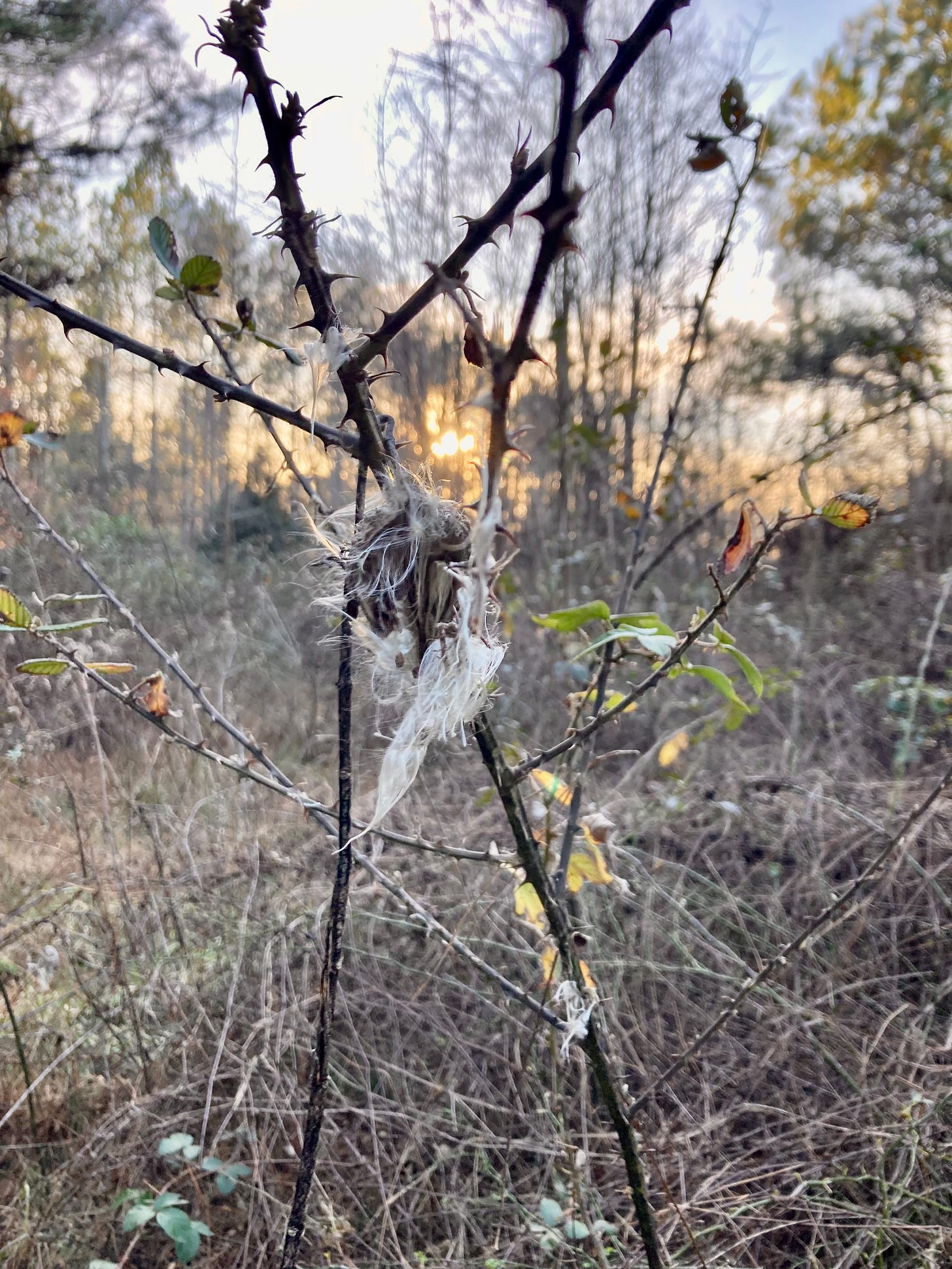

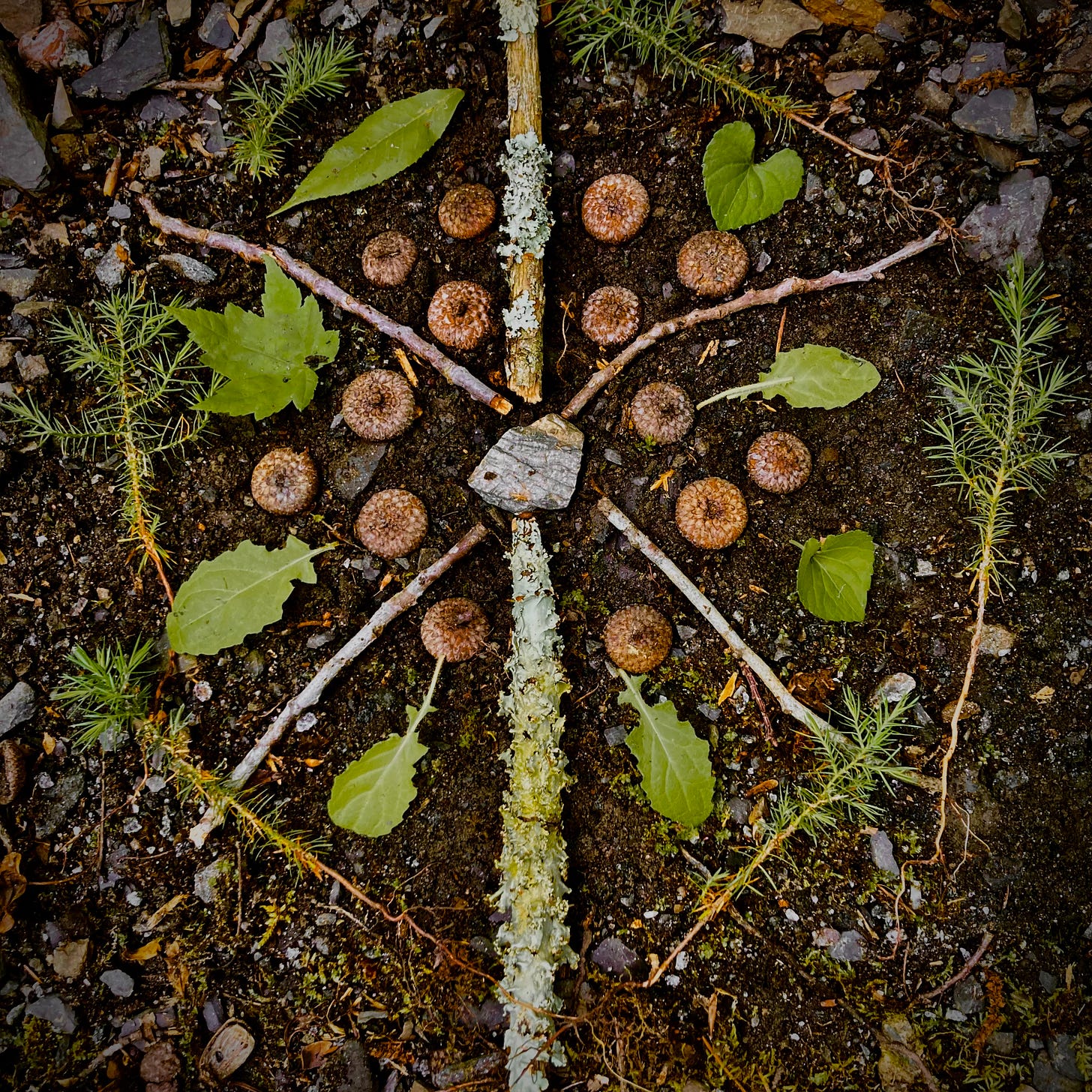
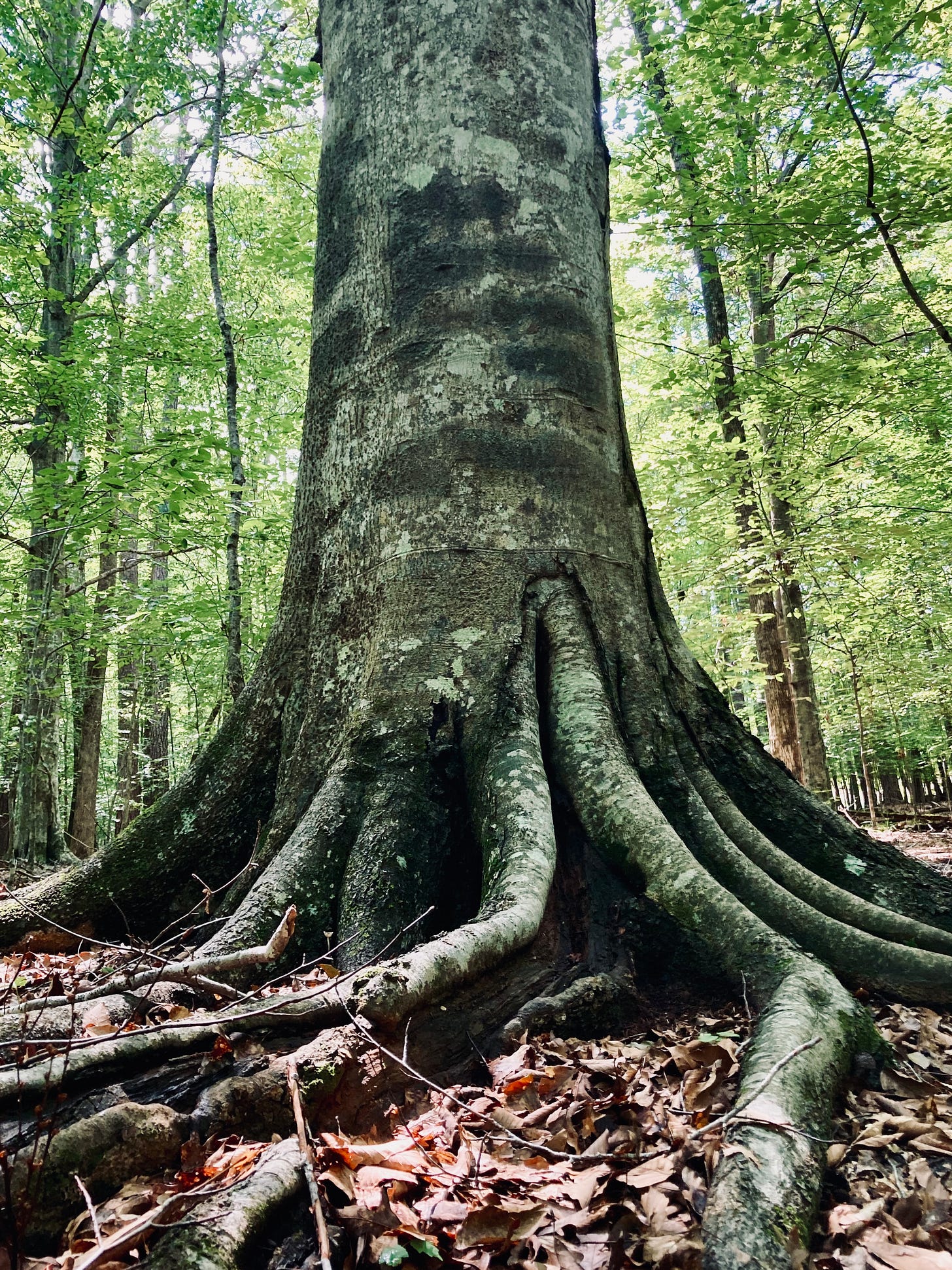
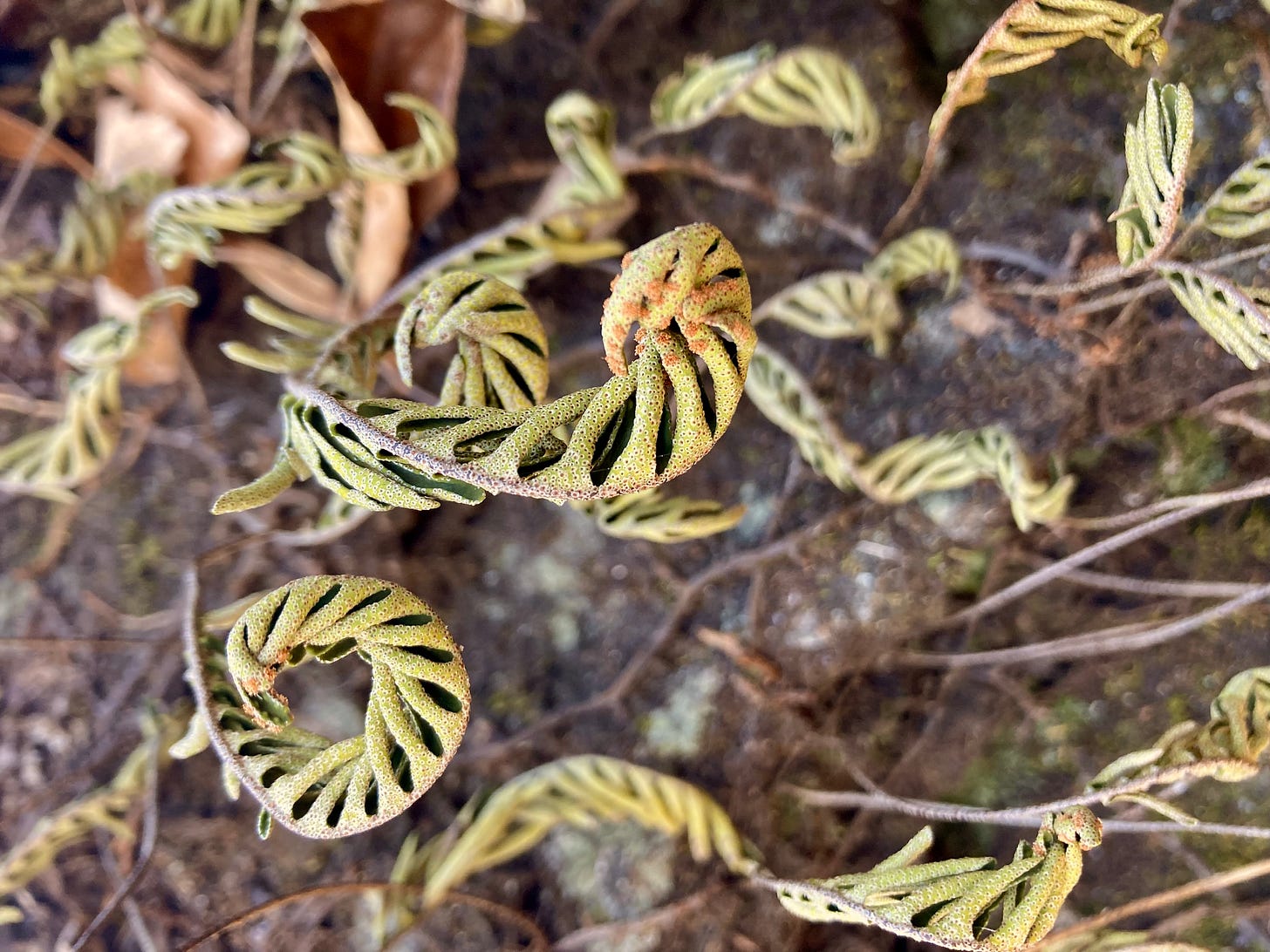
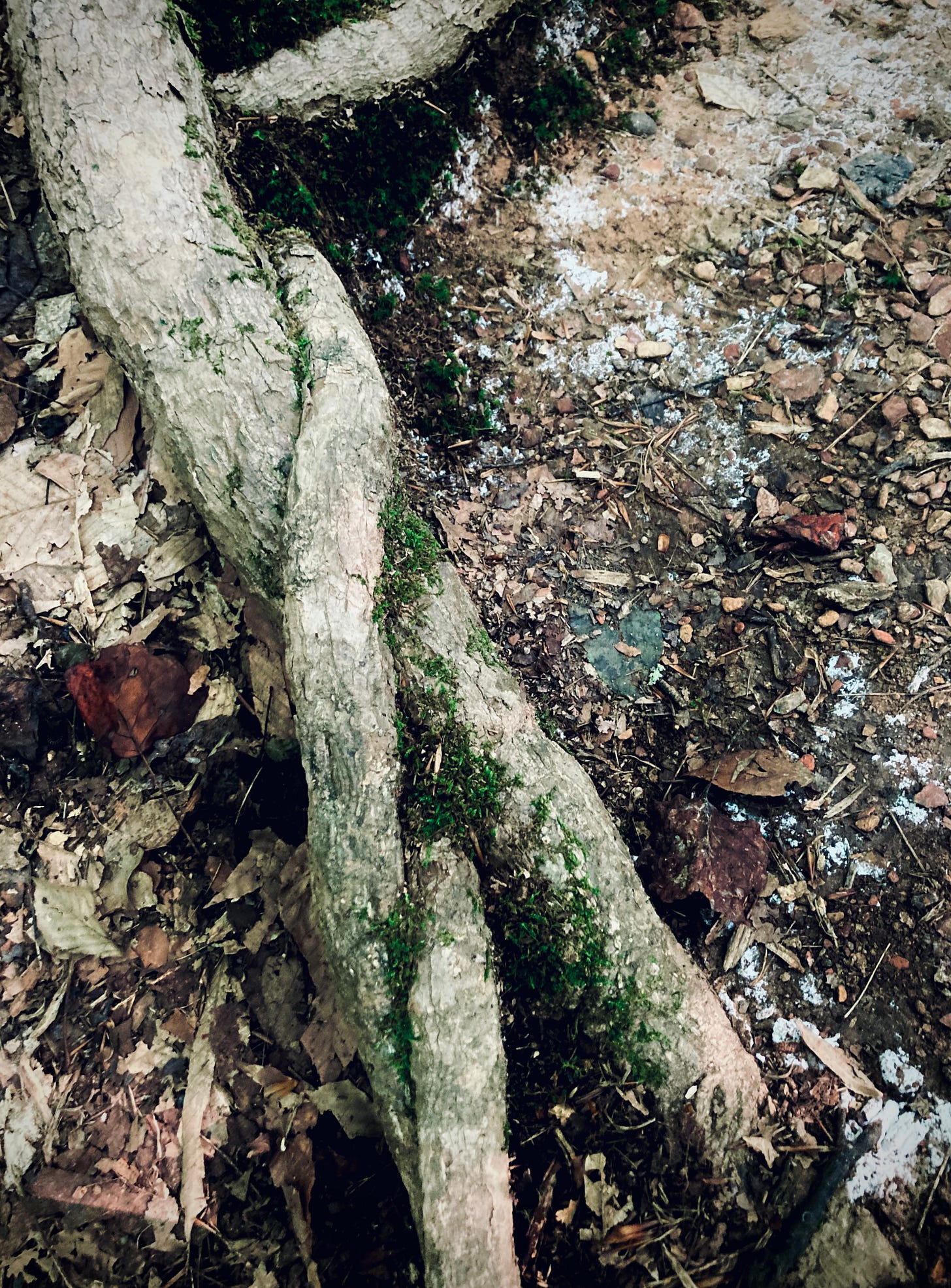
I don't know how much experience you have writing fiction, Ann (I mostly know you from your beautiful poems and various reflections), but this is a really lovely read -- both as parts and as a whole. It pulls you into its world, its characters, and everything in between.
So beautiful. And Annu’s grief, marrying itself alongside beauty is a visceral remembrance of healing’s mysterious, unexplainable, unmappable way. “The forest is teaching me how grief and beauty are collaborators, each making the other more true.” 🙏